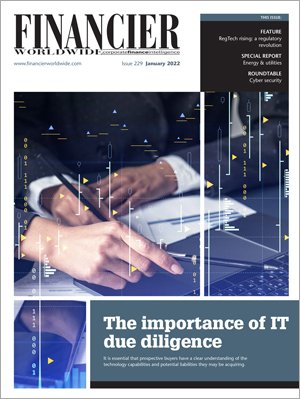US economic sanctions: enforcement and compliance
January 2022 | FEATURE | GLOBAL TRADE
Financier Worldwide Magazine
In October, the US Treasury Department released its ‘2021 Sanctions Review’. According to the report, the economic and financial sanctions employed by the US over the past two decades to battle global terrorism, nuclear proliferation, drug cartels and other threats must be adapted to a rapidly changing financial world. The department said it needs to modernise the technology it uses and upgrade its workforce to deal with new techniques and tools, such as digital currencies.
Virtual currencies and other emerging payment technologies present evolving risks. As the report notes: “Technical innovations such as digital currencies, alternative payment platforms and new ways of hiding cross-border transactions all potentially reduce the efficacy of American sanctions. These technologies offer malign actors opportunities to hold and transfer funds outside the traditional dollar-based financial system.”
The report emphasises the importance of economic sanctions enforcement keeping pace with new and emerging techniques being employed by cyber criminals, and a changing financial system where assets such as cryptocurrencies have already started to reduce the use of the US dollar.
In addition, nearly $600m in transactions linked to possible ransomware payments were reported by US banks in the first six months of 2021 alone, according to FinCEN, with the total volume of suspected ransomware payments on pace to nearly double since 2020.
While the Treasury’s report did not set out the specifics of the department’s plans, in October the US and more than 30 other countries committed to coordinating actions against ransomware attacks by increasing cross-border data sharing and tightening regulations on crypto markets.
The Treasury also issued guidance to virtual currency exchangers, administrators, miners, wallet providers and other financial services firms with ties to the cryptocurrency industry, on how to comply with US economic sanctions to combat ransomware and other nefarious uses of cryptocurrencies.
The guidance highlighted the need for geolocation tools to identify and block IP addresses originating from sanctioned countries, for transaction monitoring to identify and investigate virtual-currency transactions involving sanctioned entities and individuals, and for periodically conducting ‘look-backs’ over transactions if the Treasury’s sanctions unit blacklists a new virtual-currency address.
Furthermore, in its report the Treasury recommended steps to improve the use of economic sanctions as a tool for responding to US national security concerns and foreign policy challenges.
“A year into the Biden administration, economic sanctions remain an important tool in US foreign policy.”
To ensure their future effectiveness, the Treasury recommended that economic sanctions be: (i) deployed when supported by clear policy objectives; (ii) coordinated with US allies and partners, where possible; (iii) calibrated to mitigate unintended economic, political and humanitarian consequences; (iv) easily understood, enforceable and adaptable; and (v) supported by a modernised technological base, workforce and infrastructure, including by “deepening [the Treasury’s] institutional knowledge and capabilities in the evolving digital assets and services space”.
The Treasury’s report concludes that modernising sanctions “will require Treasury, and others in the US government, to make difficult decisions about where and when to recommend the use of sanctions”.
Improving compliance efforts
For companies across jurisdictions and throughout many different industries, compliance with US sanctions can be complex. It is vital that organisations keep pace with new developments. In-house monitoring of new sanctions and export control announcements is essential.
Internal controls must be appropriate and effective, which requires companies to conduct due diligence and rigorously monitor their customers, business partners and transactions. In its most recent guidance, the Treasury’s Office of Foreign Assets Control (OFAC) emphasises that internal controls should be risk-based and tailored to a company’s activities.
Regular training should also be undertaken for all employees to cover frequent changes to sanctions programmes and the emergence of new technologies which may impact enforcement down the line. It is also prudent to periodically test data collection procedures to account for avoidable human error.
Finally, implementing a technological solution to assist with sanctions compliance has evolved over the last decade from a ‘nice to have’ to an essential system for companies conducting international business. Going forward, using sophisticated automated solutions as part of compliance programmes will greatly assist companies to keep abreast of changes to various prohibited parties lists in the US and abroad.
Trends in sanctions enforcement
In total, OFAC took 62 sanctions enforcement actions against US and foreign parties for violating US sanctions during the Trump administration – a 20 percent decline compared to president Obama’s second term. So, despite designating US sanctions at a record pace, the agency actually reduced the actions it took to enforce them. The majority of enforcement actions OFAC did take involved firms in the trade, manufacturing, travel and technology industries, rather than financial services, previously a key area of focus.
A year into the Biden administration, economic sanctions remain an important tool in US foreign policy. The US continues to impose new measures in response to national security threats
and is in the process of completing a comprehensive review of current sanctions policies and practices to ensure they are used strategically and appropriately.
In April 2021, the US announced a significant expansion of sanctions on Russia, including new restrictions on the ability of US financial institutions to deal in Russian sovereign debt and the designation of more than 40 individuals and entities for supporting the Kremlin’s activities abroad. The administration imposed sectoral sanctions on some of Russia’s most economically consequential institutions, including the central bank, finance ministry and sovereign wealth fund.
Economic sanctions will continue to be a key lever for the Biden administration, so it is imperative that companies achieve compliance.
© Financier Worldwide
BY
Richard Summerfield


